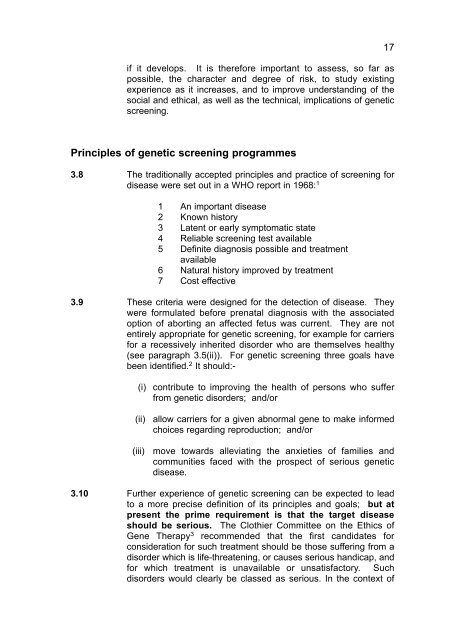Genetic screening: ethical issues - Nuffield Council on Bioethics
Genetic screening: ethical issues - Nuffield Council on Bioethics
Genetic screening: ethical issues - Nuffield Council on Bioethics
Create successful ePaper yourself
Turn your PDF publications into a flip-book with our unique Google optimized e-Paper software.
17<br />
if it develops. It is therefore important to assess, so far as<br />
possible, the character and degree of risk, to study existing<br />
experience as it increases, and to improve understanding of the<br />
social and <str<strong>on</strong>g>ethical</str<strong>on</strong>g>, as well as the technical, implicati<strong>on</strong>s of genetic<br />
<str<strong>on</strong>g>screening</str<strong>on</strong>g>.<br />
Principles of genetic <str<strong>on</strong>g>screening</str<strong>on</strong>g> programmes<br />
3.8 The traditi<strong>on</strong>ally accepted principles and practice of <str<strong>on</strong>g>screening</str<strong>on</strong>g> for<br />
disease were set out in a WHO report in 1968: 1<br />
1 An important disease<br />
2 Known history<br />
3 Latent or early symptomatic state<br />
4 Reliable <str<strong>on</strong>g>screening</str<strong>on</strong>g> test available<br />
5 Definite diagnosis possible and treatment<br />
available<br />
6 Natural history improved by treatment<br />
7 Cost effective<br />
3.9 These criteria were designed for the detecti<strong>on</strong> of disease. They<br />
were formulated before prenatal diagnosis with the associated<br />
opti<strong>on</strong> of aborting an affected fetus was current. They are not<br />
entirely appropriate for genetic <str<strong>on</strong>g>screening</str<strong>on</strong>g>, for example for carriers<br />
for a recessively inherited disorder who are themselves healthy<br />
(see paragraph 3.5(ii)). For genetic <str<strong>on</strong>g>screening</str<strong>on</strong>g> three goals have<br />
been identified. 2 It should:-<br />
(i)<br />
(ii)<br />
(iii)<br />
c<strong>on</strong>tribute to improving the health of pers<strong>on</strong>s who suffer<br />
from genetic disorders; and/or<br />
allow carriers for a given abnormal gene to make informed<br />
choices regarding reproducti<strong>on</strong>; and/or<br />
move towards alleviating the anxieties of families and<br />
communities faced with the prospect of serious genetic<br />
disease.<br />
3.10 Further experience of genetic <str<strong>on</strong>g>screening</str<strong>on</strong>g> can be expected to lead<br />
to a more precise definiti<strong>on</strong> of its principles and goals; but at<br />
present the prime requirement is that the target disease<br />
should be serious. The Clothier Committee <strong>on</strong> the Ethics of<br />
Gene Therapy 3 recommended that the first candidates for<br />
c<strong>on</strong>siderati<strong>on</strong> for such treatment should be those suffering from a<br />
disorder which is life-threatening, or causes serious handicap, and<br />
for which treatment is unavailable or unsatisfactory. Such<br />
disorders would clearly be classed as serious. In the c<strong>on</strong>text of
















